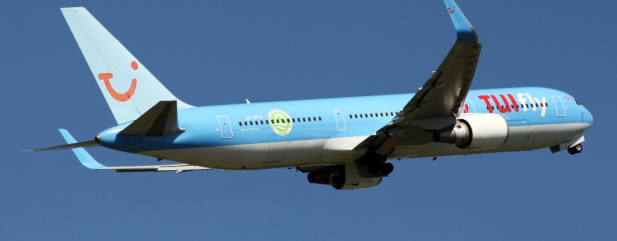Archived article
Please note that tax, investment, pension and ISA rules can change and the information and any views contained in this article may now be inaccurate.
Can Thomas Cook and TUI shares take off?

Freezing January temperatures are a likely catalyst for people to start planning their sun-soaked getaway, city break or quiet retreat through tour operators such as Thomas Cook (TCG) or TUI (TUI).
WHO HAS DELIVERED BETTER RETURNS
Over the last five years, investors would have made the most money from Thomas Cook, which has a £1.91bn market value, with a 132.5% return.
TUI is worth £9.12bn. Investors would have only benefited from a 43.5% return over the same period.
In part this reflects the fact Thomas Cook has been in recovery mode for a large chunk of this period, the shares having hit rock bottom at little more than 10p back in 2012. In the interim the business has drastically reduced indebtedness - from more than £860m to around £40m.
Tour operators allow customers to buy package holidays online, through a distribution network or via third-party travel agents.
Both Thomas Cook and TUI are seasonal businesses, generating the majority of their revenue and earnings from the summer season. Investors should therefore not be spooked by losses over quieter months.
It is easy for investors to think of these rivals as purely tour operators, but these firms focus on different areas and pursue growth through distinct strategies.
An exciting catalyst for Thomas Cook is its joint venture with Chinese conglomerate Fosun, while TUI plans to sail to a sunnier outlook by increasing its cruise ship capacity.
SHIFTING SALES FROM IN-STORE TO ONLINE
A big threat to the leisure sector is a shift from physical stores to online sales, helping drive the growth of competitors such as beach holidays specialist On The Beach (OTB).
But HSBC analyst Ali Naqvi argues holiday package sales have remained resilient, expecting growth of 2% to 3% per annum over the next three years.
This is not the only issue looming over performance. Nearly a decade on Thomas Cook is still recovering from difficult trading during the financial crisis, while there are concerns over higher costs at TUI.
As demand is subdued for destinations in the Eastern Mediterranean and North Africa, there are worries that hotel suppliers in Greece and the Canaries could demand more cash.
HOW DOES THOMAS COOK STAND OUT FROM THE CROWD?
Thomas Cook is a leisure travel firm that operates in the UK, Continental Europe and Northern Europe. It generates nearly three quarters of overall sales in the UK and Continental Europe.
The company owns German airline Condor and Thomas Cook Airlines Scandinavia, and has long leases on several planes. Seats are available to the tour operator to sell to customers through the Thomas Cook website or through distribution channels.
HSBC says investors are overlooking a faster than expected recovery of the airline division due to more long-haul destinations and a better performance at Condor.
Thomas Cook’s joint venture with Fosun expands the tour operator’s reach by offering domestic, inbound and outbound travel services to China.
Since launching Thomas Cook China in September 2016, 20,000 customers have flown to China. The company aims to increase the numbers ten-fold from this modest base in 2018.
WHAT DOES TUI DO?
Formed through the merger of TUI AG and TUI Travel in 2014, TUI is a leading European tour operator that specialises in sales and marketing, as well as holiday experiences.
Customers can create their own holidays, choosing their own hotels, cruises and flights thanks to the firm’s owned and third-party flying capacity.
The sales division provides over 20m customers every year with personalised holiday experiences through multiple channels and travel agencies. Overall, sales and marketing contributed 44% of earnings in the year to 30 September 2017.
Accounting for the rest of earnings are hotel and cruise activities including 380 hotels globally in hotspots such as the Western and Eastern Mediterranean, North Africa, the Caribbean and Egypt.
Hotels operate under an ownership, lease, management or franchise model, while TUI’s own brands include Robinson, TUI Magic Life and TUI Blue.
Whether customers are looking for a luxury cruise or expedition experience, TUI can accommodate a range of preferences through 16 cruise ships across three brands, TUI Cruises, Marella and Hapag-Lloyd.
WHAT AFFECTED PERFORMANCE IN 2017?
Shares in Thomas Cook took a battering in November as investors were shocked by a weaker gross margin due to competition and higher costs, particularly for holidays to Spain.
This short-term disappointment should not mask the progress the travel agent has made progress with its turnaround. In the year to 30 September, underlying profit from operations rose 28% to £330m and sales increased 15% to £9bn.
Demand is starting to recover for holidays to Turkey and Egypt, while sales for this summer are strong with higher prices.
TUI had an easier ride in 2017, delivering 12% growth to €1,102m thanks to strong growth in its hotel and cruise brands. It hopes to maintain annual earnings growth upwards of 10% until at least 2020.
HOW IS GROWTH BEING ACHIEVED?
Thomas Cook is focusing on a portfolio of own-brand and partner hotels, helping to push up selling prices and margins.
It has 20 own-brand hotel openings in the pipeline over the next 18 months in destinations including Spain, Italy, Crete and Croatia.
Berenberg’s Stuart Gordon threw cold water on Thomas Cook’s progress. He argues there was little disruption outside of its control, yet earnings growth lagged as more cost-cutting is required.
He sees no end to competitive pressures that undermine performance with restructuring costs expected to hit £100m a year for the foreseeable future.
By the end of 2019, TUI plans to open between 40 and 50 new hotels, which are anticipated to provide €3m of EBITA per hotel.
The group’s portfolio of owned/leased hotels will be largely based in the Western Mediterranean, Caribbean and Asian destinations.
HSBC’s Navqi points out that this geographic focus is significant as these regions are resilient long-haul holiday destinations and historically have been less impacted by geopolitical incidents.
A recovery in Turkey could help earnings beat expectations as hotel bookings are up 70% for this summer.
TUI also plans to boost capacity in the cruise market, with six new cruise ships planned by 2019.
Naqvi says investors are underestimating earnings potential from new ships. The analyst has pencilled in a 5% boost to earnings before interest, tax and amortisation (EBITA) over the longer term.
JP Morgan’s Jaafar Mestari says TUI’s €16bn disposal of three large assets - HotelBeds, Travelopia and Hapag Lloyd - should cover most capex and aircraft financing until 2019.
PARTNERING FOR SUCCESS
Thomas Cook diverges from TUI through its greater reliance on partnerships.
Apart from the tie-up with Fosun, the tour operator is working with industry investor LMEY to create a joint hotel investment platform that can boost growth in its own-brand hotels and resorts.
In September 2017, Thomas Cook sealed a deal with Expedia to cut costs and expand choices for customers. Expedia will use its tech to deliver additional bookings to the tour operator by offering over 60,000 extra hotels in global cities and Europe.
Thomas Cook has also agreed with Webjet to take over contracting sun and beach hotels for the firm. The firm can further invest in this area through its option to include its beach package holidays on Expedia sites globally. (LMJ)
Important information:
These articles are provided by Shares magazine which is published by AJ Bell Media, a part of AJ Bell. Shares is not written by AJ Bell.
Shares is provided for your general information and use and is not a personal recommendation to invest. It is not intended to be relied upon by you in making or not making any investment decisions. The investments referred to in these articles will not be suitable for all investors. If in doubt please seek appropriate independent financial advice.
Investors acting on the information in these articles do so at their own risk and AJ Bell Media and its staff do not accept liability for losses suffered by investors as a result of their investment decisions.
Issue contents
Big News
- Dollar hits three-year low
- Premier plays down Batchelors sale chatter
- Melrose launches GKN charm offensive
- The winners and losers from Carillion’s demise
- JD says profit will be better than expected
- Savills CEO steps down after nearly 40 years at firm
- Sting in the tail for BP on Deepwater Horizon oil spill
- Dividend downgrades for Card Factory

 magazine
magazine











